Central and state governments rules to combat single-use plastics environmental abuse, the toil of NGOs and effort of individuals is being challenged by a virus that makes disposable attractive, reusable unsafe
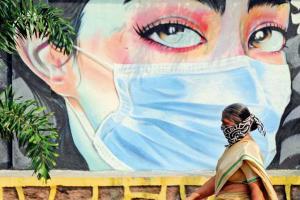
A woman in Mumbai, wearing a cloth mask, walks past the graffiti of a non-biodegradable polypropylene mask. To do your bit for the environment, experts urge that you wear a washable cloth mask. Pic/Getty Images
The Creado family made an earnest attempt to go green when the Maharashtra government announced a ban on plastics in 2018. Having witnessed mounds of non-biodegradable waste wash ashore near their sea-facing home, Reagan Creado, an organic farmer and green warrior, convinced his parents, Sandra and Colin, to adopt a plastic-free lifestyle. And in that, they met with considerable success. The polythene shopping bags were replaced with sturdier cloth bags and steel dabbas, used specifically for fish and meat items picked up at the cold storage. All plastic bottles at home were ditched for recycled, glassware. The plastic garden pots made way for those made from ceramic and clay. Reagan even dug pits in their garden to compost vegetable leftovers. These tiny changes, he remembers, made the family more "environmentally-focused". The pandemic, sadly, upended everything.
For a better part of the lockdown, Reagan didn't step out of home, as he lives with elderly parents. "We started ordering in more frequently from our local kirana- and sabziwallas." This meant that they now had absolutely no control over the packaging these items were coming in. "Just a few days ago, there was a farmer's market organised in the neighbourhood, and since I wasn't at home, mum placed the order over phone. The vegetables were delivered in 12 separate bags, all plastic. It felt like an absolute waste, but do we have a choice?" From almost zero-waste living, the Creados are now struggling to keep a check on their daily plastic consumption. "I am afraid it's not going to change anytime soon," feels Reagan.
ADVERTISEMENT
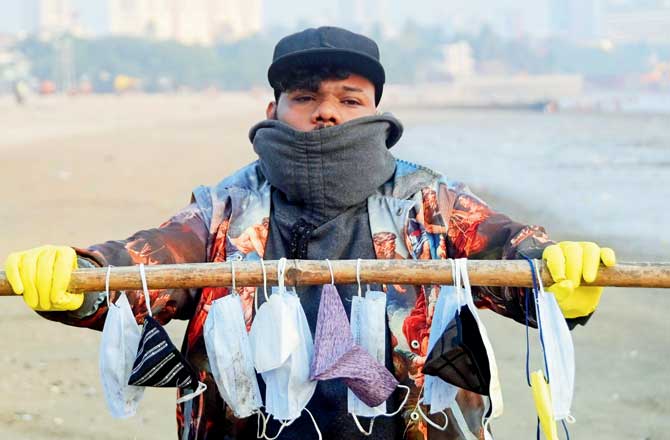
A Mumbaikar at Girgaum Chowpatty collects discarded masks. According to MPCB's report, titled Impact Evaluation of COVID-19 Pandemic on Environmental Attributes, during the first four lockdowns, there was a 45 per cent increase in bio-medical waste generation in Maharashtra from the pre-COVID-19 period. Pic/Bipin Kokate
While strict implementation of lockdowns across the globe led to a dramatic drop in greenhouse gas emissions, a report by the United Nations Conference on Trade and Development (UNCTAD) revealed that this development was not all that positive. Apart from a surge in pollution from plastic face masks and hand sanitiser bottles, plastic waste generated by individuals also increased globally, as use of disposable products became the norm. "Historical data tells us that about 75 per cent of Coronavirus plastic will likely become waste clogging our landfills and floating in our seas. And the costs are staggering," the UNCTAD report warned.
Read: We've resources for COVID-19 vaccination within 3-4 weeks: Delhi government
One of the biggest problems of the pandemic globally, has been tackling the problem of waste—bio-medical and plastics, in particular. In India, this is more ambient, as the country's relationship with waste has always been a complicated one.
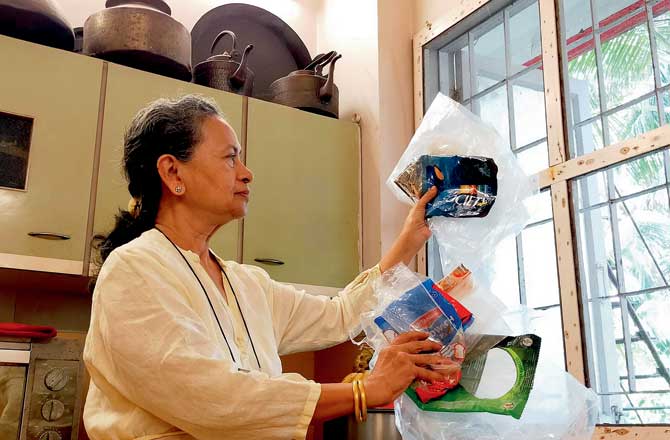
Organic farmer and green warrior Reagan Creado's mother Sandra does an audit of the plastic bags in the house. The family had been following a zero-waste lifestyle until the lockdown made it almost impossible to do so
Assa Doron and Robin Jeffrey, authors of Waste of a Nation: Garbage and Growth in India (Harvard University Press, 2018), which was awarded the biennial President's Prize of the South Asian Studies Association of Australia this week, tell mid-day that though policies of recent years—Swachh Bharat Abhiyan, for instance—have raised awareness, "public sanitation depends on daily attention to detail by citizens, by well-resourced local governments and their workers and by the managers of facilities that receive waste". Those processes are, unfortunately, hard to establish and maintain. "As India becomes more urbanised, public sanitation becomes more urgent. Methods and maintenance are a constant challenge, and except for citizen involvement, which is essential, no single method or system suits every part of a country as diverse as India," they say in an email interview.
A case in point being bio-medical waste (BMW), which includes all waste generated during the diagnosis, treatment and immunisation of human beings, and animals or in research activities. Four years ago, the Central Government, Ministry of Environment, Forest and Climate Change (MoEF&CC) introduced the Bio-Medical Waste Management Rules, 2016 (BMWM Rules 2016). This came into force in supersession of the Bio-Medical Waste (Management and Handling) Rules, 1998. But, the year 2020, has challenged every law in the rule book with regards to BMW management.
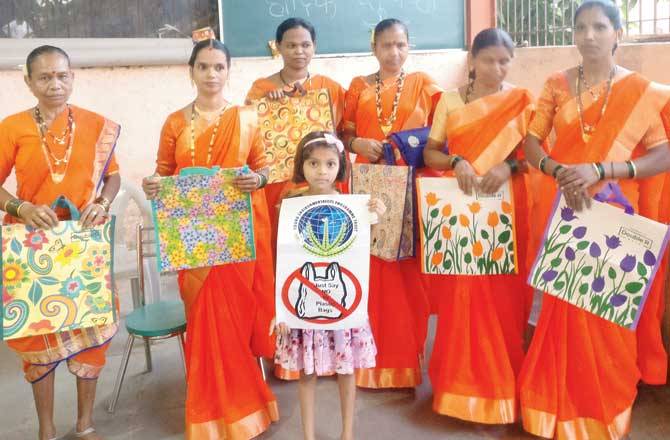
Members of Elsie Gabriel's Young Environmentalists Programme Trust celebrate an eco-Diwali with adivasis in Aarey
According to data shared by Central Pollution Control Board (CPCB), India has generated over 18,000 tonnes of COVID-19 related BMW between June and September. This included personal protective equipment (PPE), gloves, face masks, head covers, plastic coveralls, hazmat suits, syringes among other gear used by healthcare providers and patients. Another report, Impact Evaluation of COVID-19 Pandemic on Environmental Attributes, published by the Maharashtra Pollution Control Board (MPCB), and researched and compiled by Technogreen Environment Solutions, highlighted that though the pandemic-induced lockdown led to "significant load reductions on solid waste management," the state saw an enormous rise in tonnes of daily BMW generation. In fact, during the first four lockdowns, there was a 45 per cent increase in BMW generation from the pre-COVID-19 period—from 62.3 tonnes per day to 90.6 TPD, the report said.
Read: 25 million couples in India couldn't access contraceptives due to COVID-19
Doron and Jeffrey describe medical waste as "one of the toughest and most dangerous challenges" for India. "It needs relentless attention to detail. If the public health system in a state is weak and under pressure, medical waste disposal is almost certain to be lax."
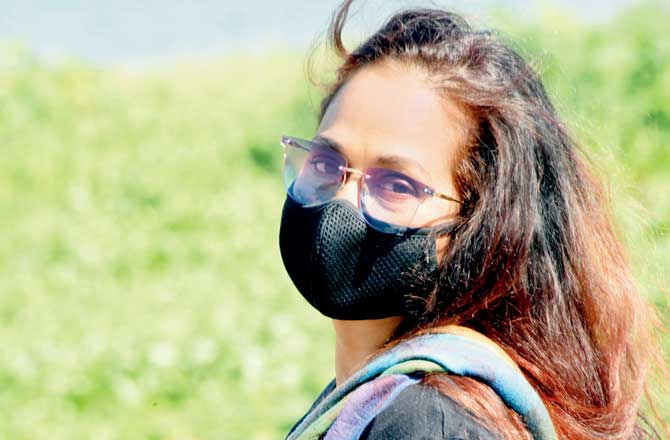
Elsie Gabriel, who is also national coordinator of the Oceans Climate Reality Project India, has been using social media to encourage people to join her zero waste-challenge. She also does clean-up drives around Powai lake, from where plastics go into Mithi river. Pic/Sameer Markande
At present, the BMC has designated separate vehicles to take bio-medical waste from hospitals, dedicated COVID-19 centres and containment zones. This waste is collected in yellow coloured, non-chlorinated bags, which are then taken to Deonar, where they are meant to be sprayed with disinfectant and incinerated immediately in a bio-medical facility. Most states are currently implementing COVID-19 waste management guidelines laid down by CPCB, which has already made four revisions to its rules since March.
Dr Ajay Ojha, managing partner of Technogreen Environment Solutions, says while the SOPs for management of waste are robust, the cause of concern is the bio-medical plastics being utilised by households—like masks, gloves and hand sanitisers—that often get mixed with the domestic waste, due to general lack of awareness about waste segregation among public. Currently, it's almost impossible to account for BMW being generated by individual households. "Bio-medical waste has a very specific characteristic, wherein there could be infectious agents associated to it. If not segregated and treated properly, the impact on the environment can be harmful. The pathogens can seep into the ground or sea, through rain water. Imagine the synergetic effect that COVID-19 waste could have?"
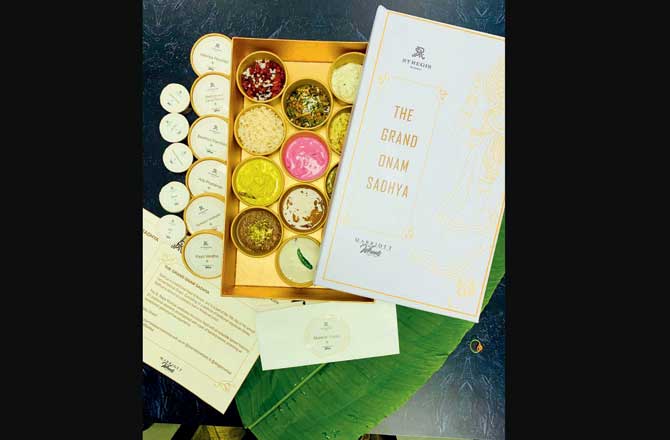
Marriott on Wheels at The St. Regis Mumbai was recently awarded the Culinary Culture's Gourmet Delivery Award 2020 for Best Delivery Packaging. The boxes for delivery that started during the lockdown were made using Kraft brown paper and high quality ITC virgin paper
Even as state governments are working overtime to tackle the insurmountable challenge posed by BMW, it's the plastic menace that authorities had just about begun to nip in the bud, which is now rearing its ugly head.
A CPCB report from 2018-19, pegged India's plastic waste generation at 3.6 million tonnes per annum, with Maharashtra being the highest contributor at 12.19 per cent. While figures from the year of the pandemic are yet to be made available, experts feel they will be worse. On one hand, the use of reusable, communal or secondhand items are being completely discouraged for hygiene safety. On the other, social distancing has led people to turn to online shopping and takeout services, which mean tonnes of products are being delivered daily to homes, wrapped in a plethora of packaging.
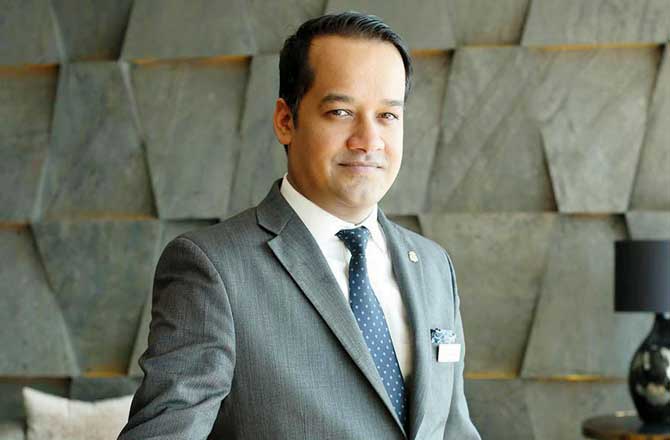
Pradeep Kandari
In all of this, the plastic industry seems to have profiteered incredibly. "Suddenly, it is okay to use plastic, and while it can be justified in times like these, my worry is that its consumption might be normalised in future, and for different reasons," feels Reagan.
Several local stores in the city, which until recently followed the bring-your-own-bag policy—adhering to Brihanmumbai Municipal Corporation rules on plastic ban—have becomes lenient In March, just few weeks before the lockdown, the civic body had conducted a special drive against single-use plastic at the Mahatma Jyotiba Phule or Crawford Market. This hit a road-block, with the Coronavirus outbreak. At a poultry shop in the bustling bazaar, which sells fresh chicken, the store manager, who wished to remain anonymous, told this writer that though the BMC had not issued guidelines on how to sell meat, many of their customers had suggested they change their packaging from biodegradeable polythene bags to boxes. "The chance of leakage is higher, and since it's a wet product, customers have become extra cautious," he shared. The shop now sells chicken and mince in disposable boxes. "We have had to incur extra packaging cost; each box comes for R5. It's impossible to pack a kilo of chicken in one box, and so, we have to use extra. But, it's the need of the hour," he added.
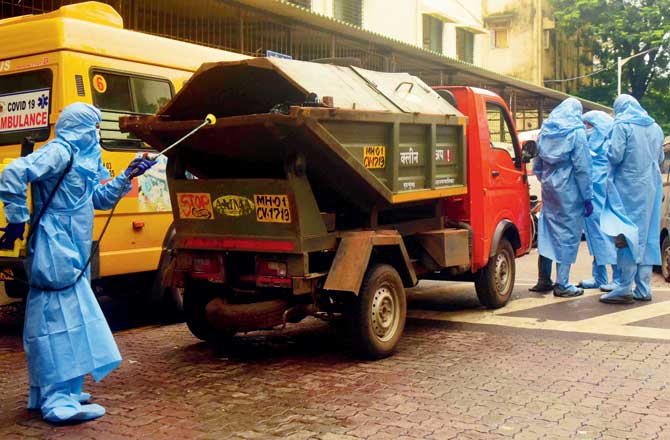
The BMC has separate vehicles to take bio-medical waste from hospitals and containment zones. This waste is collected in yellow coloured, non-chlorinated bags, and sprayed with disinfectants at Deonar before it is incinerated. Pic/Suresh Karkera
The food and beverage industry, which was struggling to cope with lockdown losses, began with takeaways, early into the lockdown.
Restaurateur Gauri Devidayal, who runs The Table in Colaba, says that while they have always made a conscious effort to reduce carbon footprint, they were confronted with newer and unforeseen challenges in the lockdown. "At the restaurant, water was served in glass bottles. We never used plastic takeaway bags. Even our takeaway boxes were made from sugarcane bagasse." When the restaurant opened for orders again in the thick of the pandemic, masks and gloves, regular sanitization became compulsory. "We ensured that our staff wore reusable, customised masks, and that they were washed regularly. We've also been adhering to BMC guidelines and segregating waste in different bags." The problem arose with the takeaways. "For the longest time, income from deliveries was our mainstay, and so, we had to expand our menu and add more variety. During the dry runs, we found that our existing packaging didn't work for all dishes. For instance, if we had a fish dish with a light sauce, the material we were using was absorbing a lot of juice. We had to move to plastic. Similarly, all our deliver bags were double packed, so that people could discard the outer layer, to avoid contamination. But, when monsoon came, our outer layer had to be plastic, as there was risk of the package getting wet," says Devidayal.
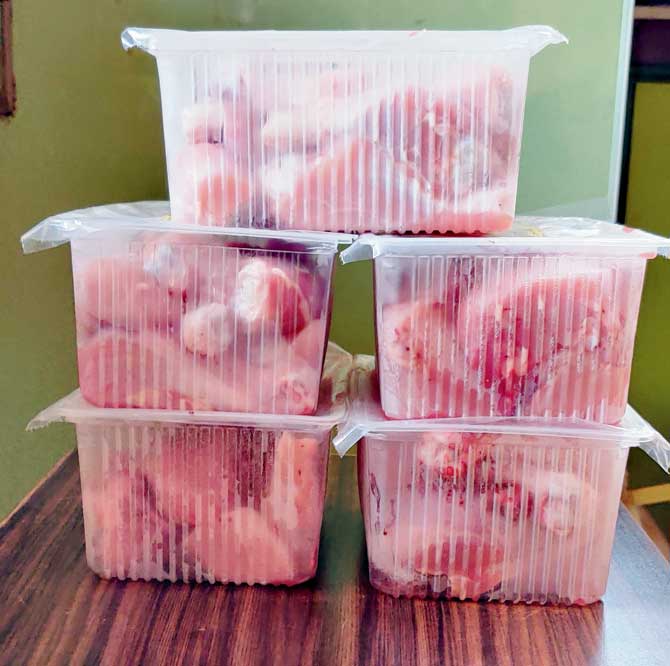
Fresh chicken is being sold in plastic boxes in some shops at Crawford Market, instead of plastic bags, to better hygiene standards
The end goal, she says, was to ensure they didn't compromise on food quality. "That could ruin the experience for the guest. One can't be so strict dogmatic that it defeats the product and the purpose of what we are doing. We had to find a balance between practicality, quality and safety. Hopefully, customers will be responsible when disposing of the plastics," she adds.
When The Table opened a month ago, Devidayal and team also moved from cloth napkins to disposable paper ones. "Yes, we've had to digress from our general policy [this year], but I am trying to figure out what else can be done to include sustainable practices [at the restaurant]. In the future, I hope to get a composting machine, since we do really have a lot of wastage. I am still figuring the logistics. We could then use the compost in my Alibaug farm. It will be a full circle, as veggies from the farm come to the restaurant."
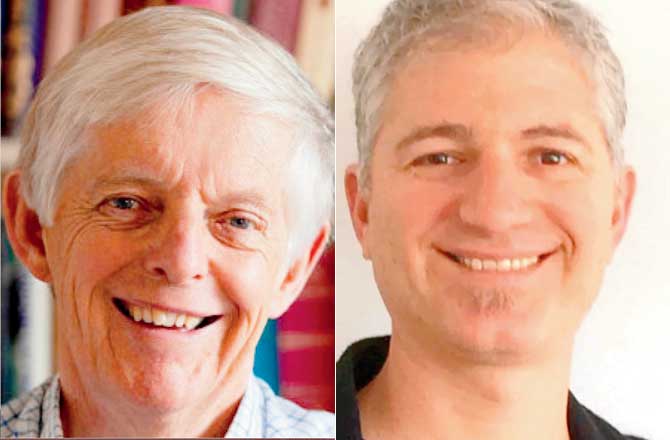
Robin Jeffrey and Assa Doron, authors Waste of a Nation
Powai-resident Elsie Gabriel has worked tirelessly for the last 15 years to create awareness about the plastic menace, especially in her neighbourhood, which is home to Powai lake. "Powai is surrounded by hills, and everything that flows down, gets washed into the lake, from where it goes to the Mithi river, and right into the ocean," says Gabriel, who started the Young Environmentalists Programme Trust, an advocacy platform to raise awareness about positive environment change, right after the 2005 deluge, caused primarily due to the clogging of Mithi with plastics. She has been holding clean-up drives in Powai, focusing on the nullahs, sewages, storm-water drains and lake. "I am doing this, so that we can tackle the source of plastic pollution." But, the lockdown has seen her efforts coming to naught. "It's a worrisome reality. COVID-19 and isolation has made us more home-bound, and now the focus is more on health. Due to this, the rules on plastic ban have become relaxed," says Gabriel, who has been trained and certified by former Vice President of USA, Al Gore, and is the national coordinator of the Oceans Climate Reality Project India.
While the pandemic may have shifted our focus towards preventive health, the environment should still be priority, as "public sanitation and public health are inextricably linked," feel authors Doron and Jeffrey. "One of the recommendations for minimising spread of the virus is hand-washing and washing of fruit and vegetables. You need clean water to do that. Ensuring adequate clean water is one of the essentials of public health, and this depends on managing sewage, runoff and reservoirs. To see the effect of indiscriminate disposal of hard waste on water bodies, consider the destruction of many of Bengaluru's lakes, the contaminated Musi in Hyderabad or the choking Yamuna in Delhi."
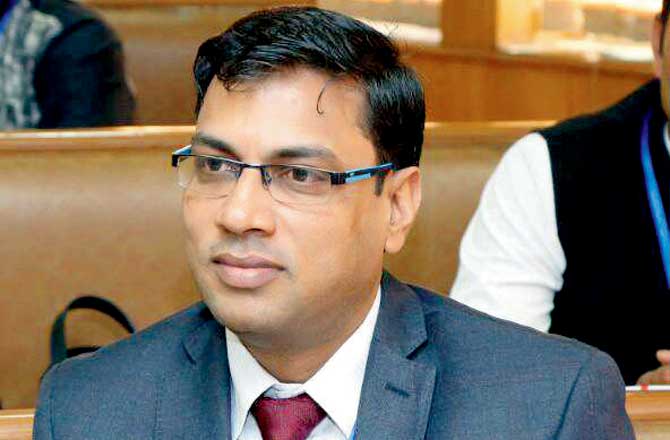
Ashish Jain, founder and director of Indian Pollution Control Association
Many corporates have been eyeing responsible business practices. E-commerce company Flipkart, which opened up its grocery delivery model during the lockdown—previously available only in select cities—has been looking at eco-friendly packaging alternatives. It has replaced single-use plastic, stretch film, polythene pouches, bubble wrap with paper shreds, recycled paper bags, carton waste shredded material and two-ply roll. "We are leveraging a good mix of technology in our fulfillment centres to help optimise the type and the volume of packaging to prevent wastage. We have [also] undertaken 'no package shipping' or shipping with only primary packaging for many products such as diapers, bedsheets, batteries, microphones, luxury products and large appliances. As of September 2020, we already achieved a 51 per cent reduction in consumption of plastic packaging," a Flipkart spokesperson told mid-day.
Marriott on Wheels at The St. Regis Mumbai also made sustainable packaging fashionable when it launched its five-star takeaway service in the pandemic. "When we decided to start the takeaway service, we were fully aware of the plastic ban, and were looking for alternatives. We wanted it to reflect our brand values," says Pradeep Kandari, director, Food and Beverage, The St Regis Mumbai. The team finalised a set of differently-sized boxes made using Kraft brown paper and high quality ITC virgin paper with durable poly coated paper material to hold liquid gravy without spillage. Their solo run was successful, and recently awarded the Culinary Culture's Gourmet Delivery Award 2020 for Best Delivery Packaging.
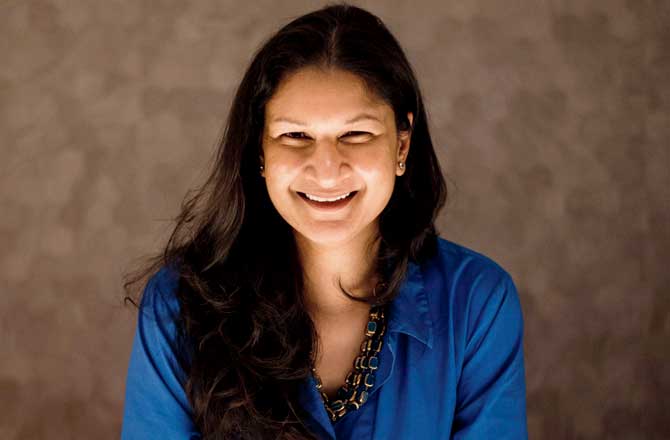
Gauri Devidayal, restaurateur. Pic courtesy/Anurag Banerjee
Though the plastic menace has been a global problem, Satish Sinha, associate director at Toxics Link, an environmental NGO, dedicated to bringing toxics-related information into the public domain, says India has not fared half as badly as other countries in the world. Toxics Link will be publishing its study on plastic waste generated during the pandemic in December. "Plastic waste has not seen a phenomenal rise here [in India], especially if you compare it with cities like Wuhan [in China], where the plastic waste generation has gone up by 50 per cent. That's because in these countries, takeaways were a norm. In India, a major part of the population, buys and eats for the day, and ordering in is still restricted mostly to the cities. A very small percentage of Indians is living off Zomato. During the lockdown, production and consumption were also down to zero. So, the plastic waste generation was not as significant.
This also hit the livelihood of many rag-pickers who collect recyclables and plastics for a living," says Sinha.
One of the solutions to handling non-bio-medical plastic waste is recycling. Ashish Jain, founder and director of Indian Pollution Control Association, India's first CPCB-registered NGO for Plastic Waste Management, has been working with rag-pickers, scrapdealers and garbage collectors to stem the issue of plastic pollution. "We've been educating them about the different grades of plastic materials, helping them collect it, and linking them with the right kind of recyclers." The initiative is part of the Ministry of Environment and Forest's Extended Producers Responsibility (EPR), Under Plastic Waste Management Rules, 2016. "Accordingly, all companies are responsible for collecting and recycling plastics introduced through their products. The policy is good, but many are still unaware of it. If 100 per cent EPR is implemented, in the coming years, irrespective of the outbreak of a pandemic or not, we won't have a single piece of plastic lying on the roadside," says Jain.
75
Percentage of Coronavirus plastic that's likely to reach landfills and oceans, according to an UNCTAD report
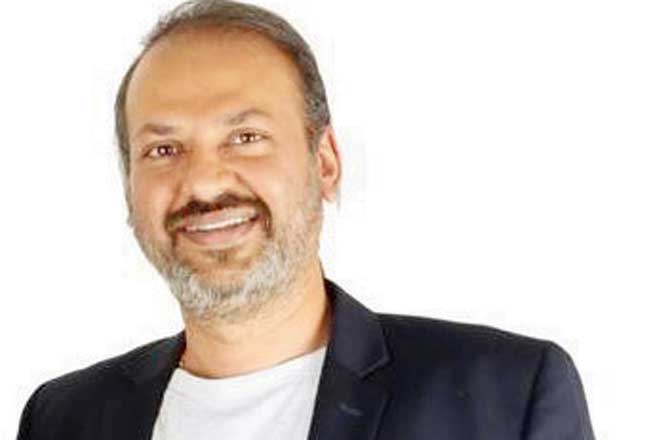
Dr Ajay Ojha, managing partner, Technogreen Environment Solutions
Cut down waste during COVID
. Conduct a plastic audit of your home, and replace plastic materials with biodegradable or glass containers
. Unless you are a frontline health worker or otherwise at high risk, try using a recyclable cloth mask and other safety tools
. If you plan a takeout from a restaurant, inform them that you will be bringing your own sustainable containers
. With order in meals on the rise, focus on composting your leftovers, either recycling or correctly disposing of your takeout containers
. Keep a glass water bottle and cloth bag handy in your backpack or car, to avoid using plastic bags and bottles
. Declutter your home—have an online thrift sale or donate clothes and other household items in good condition
. Audit your leftovers. With the world going through hard times, avoid wastage at all costs
Courtesy: Elsie Gabriel, founder Young Environmentalists Programme Trust
Keep scrolling to read more news
Catch up on all the latest Mumbai news, crime news, current affairs, and a complete guide from food to things to do and events across Mumbai. Also download the new mid-day Android and iOS apps to get latest updates.
Mid-Day is now on Telegram. Click here to join our channel (@middayinfomedialtd) and stay updated with the latest news
 Subscribe today by clicking the link and stay updated with the latest news!" Click here!
Subscribe today by clicking the link and stay updated with the latest news!" Click here!








